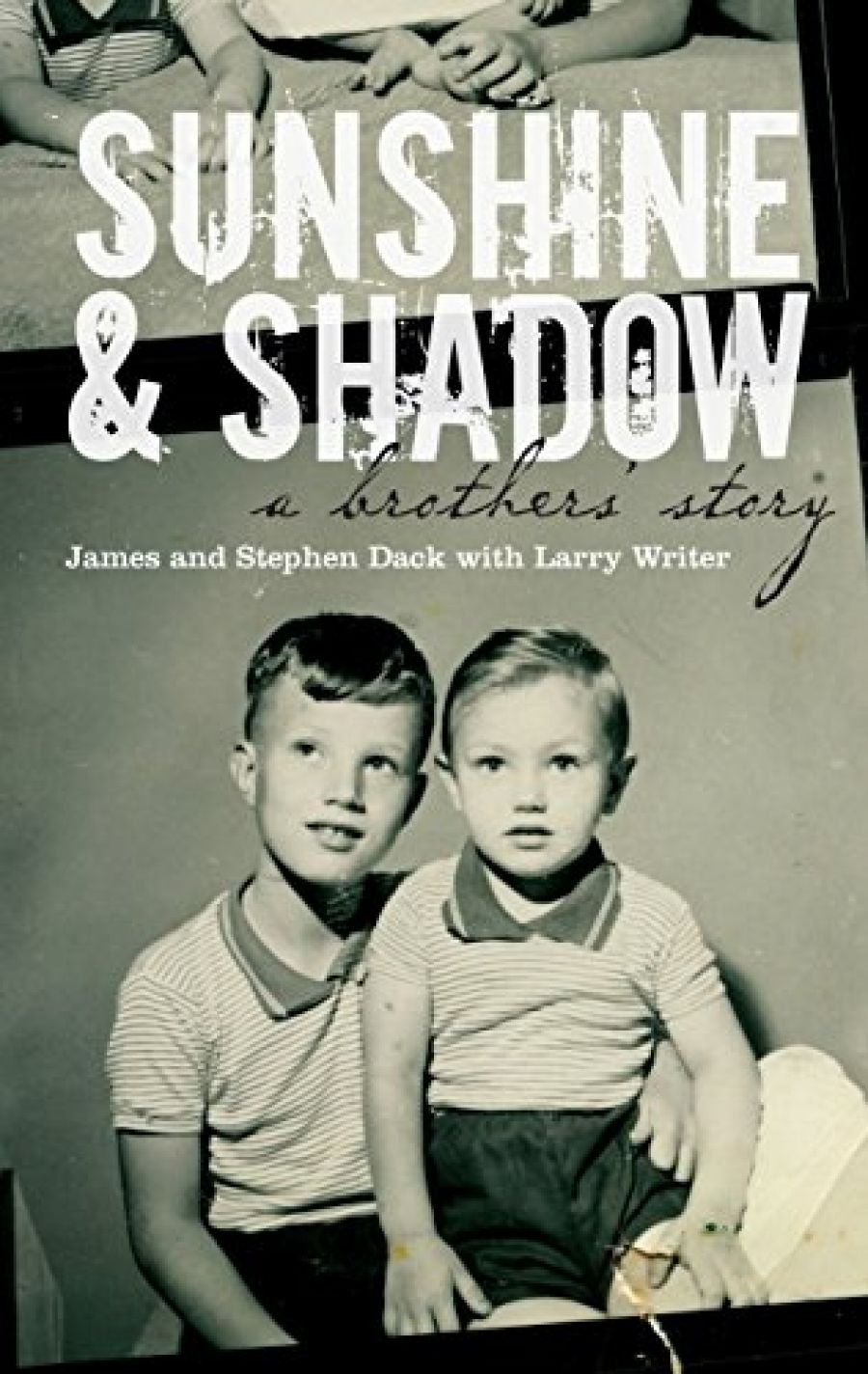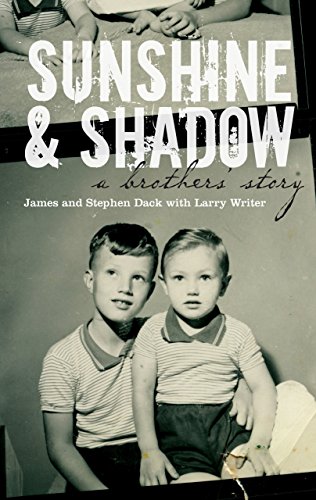
- Free Article: No
- Contents Category: Memoir
- Review Article: Yes
- Article Title: Intimate textures
- Online Only: No
- Custom Highlight Text:
Siblings tend to play little part in family memoirs that focus on parents. Most memoirists write as if they are only children. Perhaps this is unsurprising; siblings’ memories of childhood rarely correspond. As Robert Gray observes in his autobiography The Land I Came Through Last (2008), ‘the one in the family who is going to be a writer is always an only child’.
- Book 1 Title: Sunshine And Shadow
- Book 1 Subtitle: A Brothers' Story
- Book 1 Biblio: Pier 9, $34.95 pb, 305 pp
- Book 1 Cover Small (400 x 600):

The brothers’ story is certainly extra-ordinary. Born and raised ‘dirt poor’ in Housing Commission apartments in Camperdown and Woolloomooloo, they dedicate their book to their ‘heart-of-gold’ mother who ‘gave us the only thing she had to give – herself’. Their alcoholic father, who looms large in the narrative despite effectively abandoning his family when James was just ten and Stephen five, is blamed for ‘damaging her mind and body to the point where cancer took hold of her’. When their mother succumbs to cancer, James, aged twenty-one, is forced to become both father and mother to his siblings. For the most part, he succeeds admirably, though they are ineluctably damaged in ways beyond his control.
As the brothers take turns narrating their story, a useful friction is created by the way their accounts tally and diverge. James shared with his mother the indignity of his father’s physical and verbal abuse, while Stephen and Alison were never targeted. It was irredeemably destructive to James, even when his father jauntily sang old English novelty songs: ‘to my ears anyway, there was anger in his voice.’ For Stephen, he was ‘the cheeky charmer who knew all the words to those funny English pop songs’. Memories, in this regard, are central. Stephen cannot recall ‘the raised voices’ and violence, and ‘consequently, while I can be very pissed off at my father for the things I heard he did to mum and James, I can’t hate him like James does’. This difference becomes crucial. While James despises his father’s example, Stephen is intrigued by it and in many ways becomes his father: he spends a good part of his adult life as a violent alcoholic and gambler, before overcoming his addictions.
For the most part, the story is plainly told. Overworn phrases like ‘halcyon days’ and ‘skullduggery’ abound, giving their story of growing up on the ‘mean streets’ of Sydney in the 1960s and 1970s an oddly Dickensian flavour. Yet there are moments of inspired laconicism, such as Stephen (who went on to represent Australia in boxing) describing his first street fight: ‘It was a moment of clarity I had: I enjoyed hitting and being hit. There was nothing to be afraid of in a fight. His punches were heavy; they didn’t hurt me.’
The book is also a paean to their ‘heartland’ of pre-gentrified Woolloomooloo. Their scarcely credible anecdotes of boyhood derring-do around this harbour, including epic games of rugby league played on basketball courts, and ‘a particularly brutal game of hide and seek called Hares and Hounds’, conjure it as a kind of Boys’ Own Promised Land. In its depiction of a familiar suburb that was utterly lawless, it approaches Brian Matthews’s wonderful portrait of 1940s St Kilda in A Fine and Private Place (2000).
What makes one life turn out differently from another? This question haunts the narrative. As James suggests: ‘Maybe we’re born a good person or a stuff-up, and our true self inevitably emerges in spite of conditioning, good fortune or bad.’ Both brothers go on to make something of their lives: James becomes a multimillionaire real estate agent and philanthropist, while Stephen succeeds as an amateur boxer, then becomes a street sweeper while he studies, before setting up his own inner-city criminal law practice. Much of their success is attributed to the father figures who took an interest in them.
Yet Stephen’s life is dogged by self-destructiveness and self-sabotage, which assume tragic force towards the end of the memoir. On 1 April 2009, a day after his final interview session with Writer for the chapter entitled ‘Taking Stock’, Stephen took his own life. A postscript from James and Alison ends the narrative.
In Shadow of Doubt (2003), another recent memoir about the father’s influence, Richard Freadman notes a shift in autobiography ‘from towering deeds to intimate texture’. Sunshine and Shadow seems uncomfortably slung between these two poles. It explores and celebrates relationships: between mothers and sons, sons and father figures, and between brothers. But to make good on the mother’s sacrifice, and to foreground the triumph-over-adversity narrative, the book constantly returns to evidence of the successful life. This disjunction is revealed in James’s final chapter, ‘Elegy for a Champ’. Despite an affecting recount of the brothers’ final conversation, little effort is made to assess Stephen’s death. Instead, James spends the final pages listing the famous people who crewed the super-maxi yacht with him in the Sydney to Hobart Classic as a way of honouring his brother.
Though events leading up to Stephen’s death revolve around the completion of their book (they were to meet with Writer and their publisher the day Stephen died), no connection is made between Stephen’s participation in the project and his decision to end his life. To me, it suggests something of the risks involved in taking account of one’s life in autobiography.


Comments powered by CComment